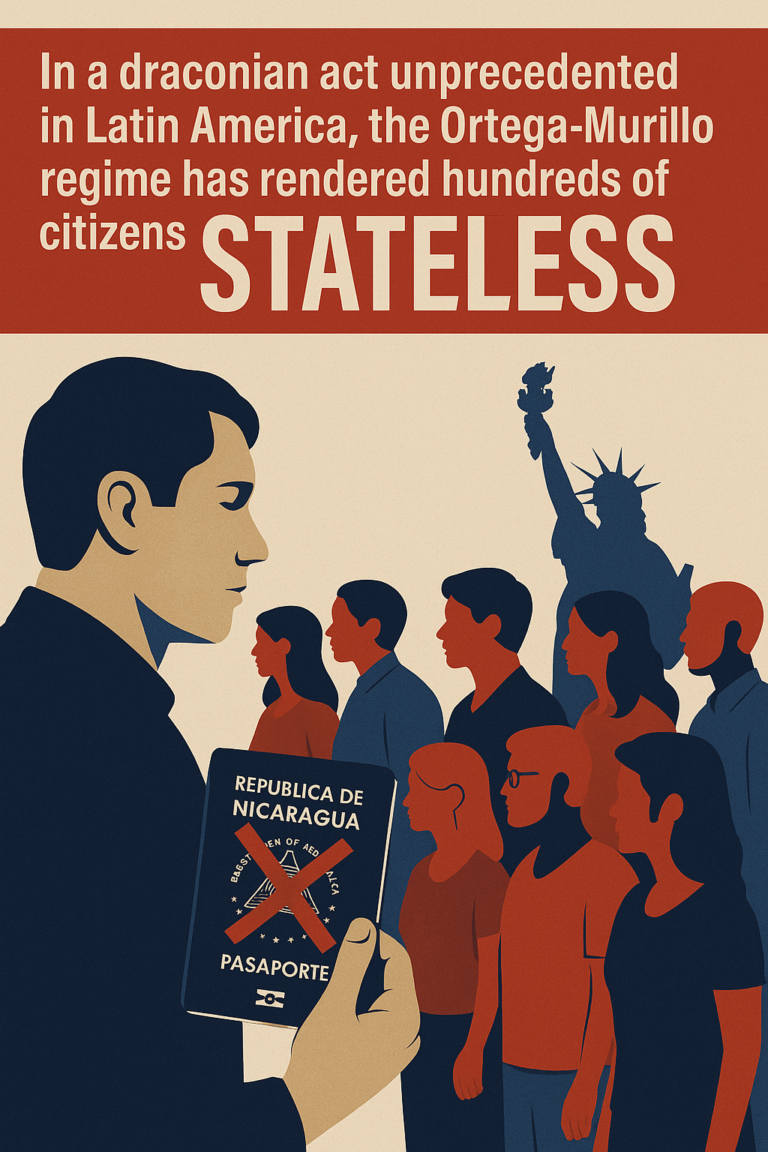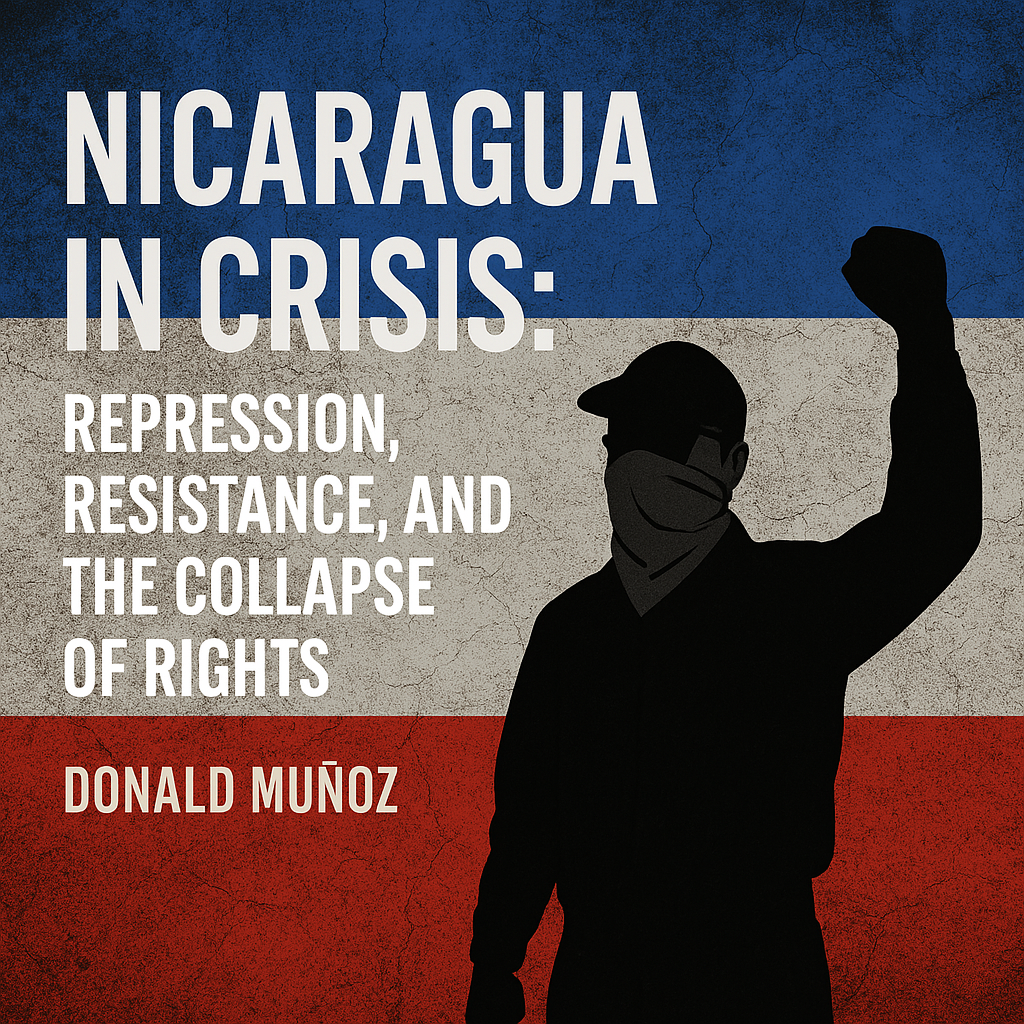In 2024, Nicaragua remains one of the most repressive regimes in the Western Hemisphere. Under President Daniel Ortega and Vice President Rosario Murillo, the country has morphed into a de facto police state, governed by fear, silence, and systemic repression. The state apparatus—judicial, legislative, and security institutions—has been transformed into tools for persecution, control, and obliteration of dissent. A new report titled “Nicaragua 2024: Derechos en crisis” reveals the depth of this deterioration and the cost borne by Nicaraguans, both inside and outside the country.
THE POLITICAL CONTEXT: FROM REVOLUTION TO AUTOCRACY
Once a revolutionary leader who fought against dictatorship, Daniel Ortega has become the very embodiment of the oppression he once resisted. Since returning to power in 2007, Ortega and Murillo have dismantled democratic institutions, eliminated checks and balances, and crushed all opposition. The 2018 popular uprising marked a turning point, unleashing a new wave of state terror. Since then, the government has shut down more than 5,000 civil society organizations, stripped over 500 people of their nationality, and incarcerated or exiled virtually every political opponent.
The regime no longer tolerates any form of organized civic life. Trade unions, student groups, professional associations, churches, and even humanitarian organizations have either been co-opted or eliminated. Elections are reduced to spectacles with predetermined outcomes. Judges, prosecutors, and police serve not the law but the presidential couple’s will.
A NATION RULED BY FEAR
Fear is the regime’s principal tool of governance. Arbitrary arrests, torture, digital surveillance, confiscation of property, and the threat of statelessness have become everyday realities. The state’s intelligence system, coordinated by Murillo, surveils Nicaraguans both online and offline. Activists, journalists, students, and even former political prisoners live under constant threat. Family members of dissidents are harassed, and government critics are often targeted even in exile.
The report documents a rise in gendered violence and harassment against women human rights defenders, particularly through digital smear campaigns. Exiled activists—especially those in Costa Rica—face constant surveillance and infiltration attempts. The regime has even extended its reach beyond borders, pressuring host governments to restrict or monitor Nicaraguan refugees.
ERASURE OF CITIZENSHIP AND EXILE AS A WEAPON
In a draconian act unprecedented in Latin America, the Ortega-Murillo regime has rendered hundreds of citizens stateless. In February 2023, 222 political prisoners were released and forcibly exiled to the United States, only to find their citizenship revoked. The government later extended this punishment to 94 more individuals, many of whom were prominent voices in civil society and academia.
Citizenship is no longer a right but a conditional privilege, revoked at the regime’s discretion. The message is clear: you either submit or you cease to exist—legally, politically, and socially.
This attack on citizenship is part of a broader strategy to erase collective memory and break resistance. The regime understands that exile can be disorienting and demobilizing. It seeks to transform activists into stateless ghosts, removed from the national story.

TARGETING YOUTH AND FUTURE LEADERSHIP
One of the most alarming findings in the report is the systematic targeting of young people. University students, who played a central role in the 2018 uprising, are subject to expulsion, surveillance, and imprisonment. The government has closed or taken over several private universities, replacing curricula with propaganda and punishing political dissent.
Education, once a space for critical thinking and civic engagement, is now an instrument of ideological indoctrination. Young leaders in exile face limited access to education, work permits, and safe organizing spaces. Despite this, many continue to mobilize from abroad, forming networks of solidarity and resistance.
THE HUMAN COST
Behind each statistic is a person, a family, a community torn apart. The repression has caused over 900,000 Nicaraguans to flee the country since 2018, many risking their lives to reach safety. Political prisoners report torture, solitary confinement, sexual abuse, and denial of medical care. Entire families have been exiled, their homes and assets confiscated.
For those who remain in Nicaragua, silence has become a survival mechanism. Speaking out is a risk that few can afford. This silence, however, should not be mistaken for consent. Beneath the surface, anger and pain simmer, waiting for a chance to erupt again.
THE ROLE OF THE INTERNATIONAL COMMUNITY
The Ortega-Murillo regime has resisted international pressure with a mix of defiance and manipulation. It has withdrawn from the Organization of American States, restricted UN human rights bodies, and aligned itself with authoritarian allies such as Russia, Iran, and Venezuela.
Nonetheless, international pressure remains a critical lifeline. Targeted sanctions, diplomatic isolation, and support for exiled organizations have helped expose the regime’s abuses and limit its external legitimacy. However, much more is needed. The international community must go beyond condemnation and provide long-term support to civil society, especially to young leaders and human rights defenders in exile.
RECOMMENDATIONS FOR ACTION
Based on the report’s conclusions, the following urgent actions are recommended:
Support for Stateless and Exiled Activists: Provide legal assistance, psychosocial support, and pathways to citizenship or residency in host countries.
Reinforcement of Independent Media and Human Rights Organizations: Ensure secure funding and training for journalists and defenders both inside and outside Nicaragua.
Accountability Mechanisms: Strengthen international justice mechanisms, including the International Criminal Court and UN Fact-Finding Missions.
Youth Empowerment: Support leadership development programs for Nicaraguan youth in exile to rebuild the country’s democratic future.
Digital Security: Expand training and access to secure communication tools to protect activists from surveillance and cyberattacks.
CONCLUSION: RESISTANCE IN EXILE
The Nicaraguan people have shown extraordinary resilience in the face of brutality. From inside the country and across borders, they continue to denounce, resist, and organize. While the Ortega-Murillo regime seeks to erase opposition through fear and exile, the collective memory and spirit of resistance endure.
As the world’s attention shifts from crisis to crisis, we must not forget Nicaragua. Its future depends not only on the courage of its people but also on the solidarity of the global community. Silence is complicity. The time to act is now.
